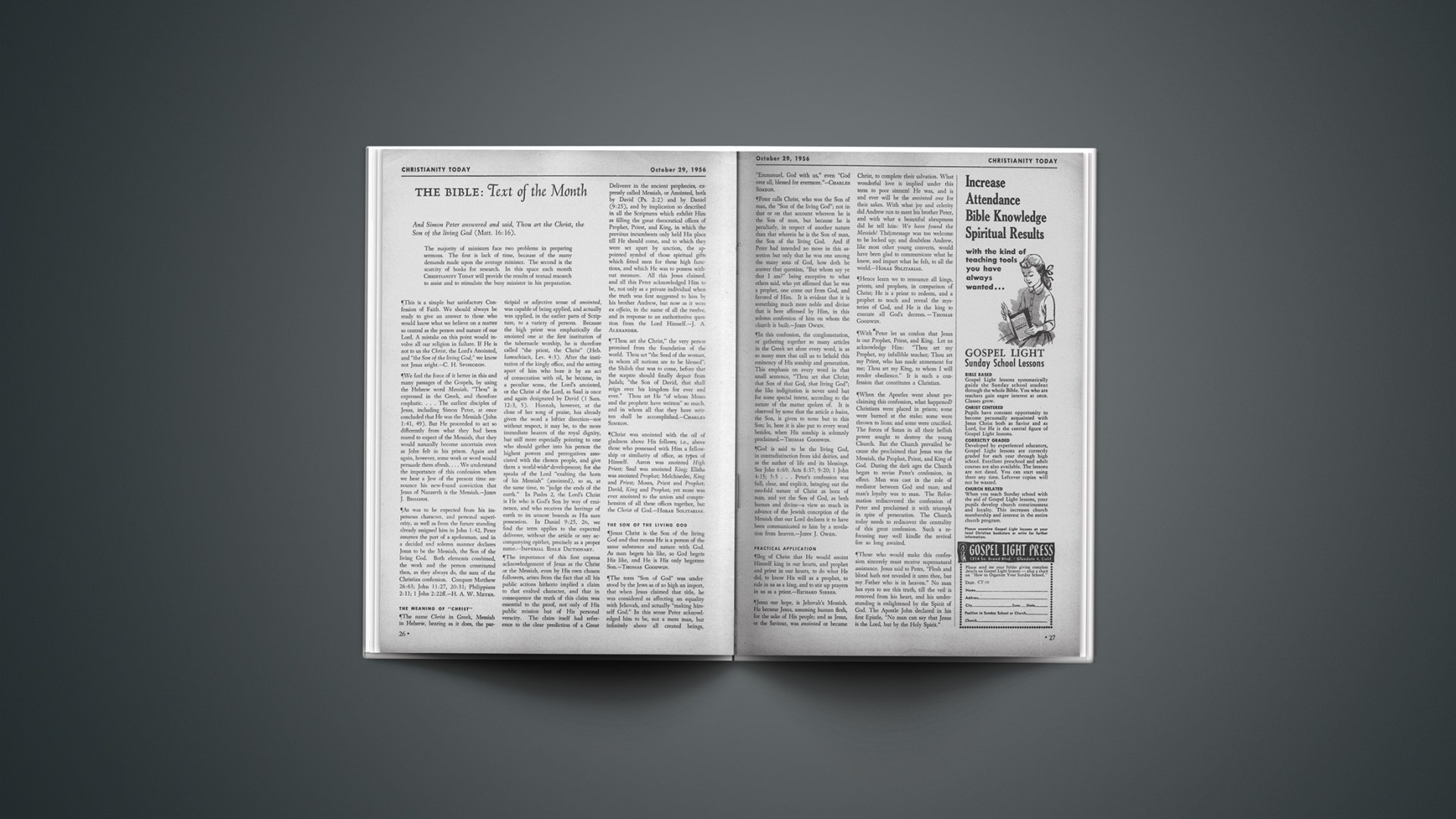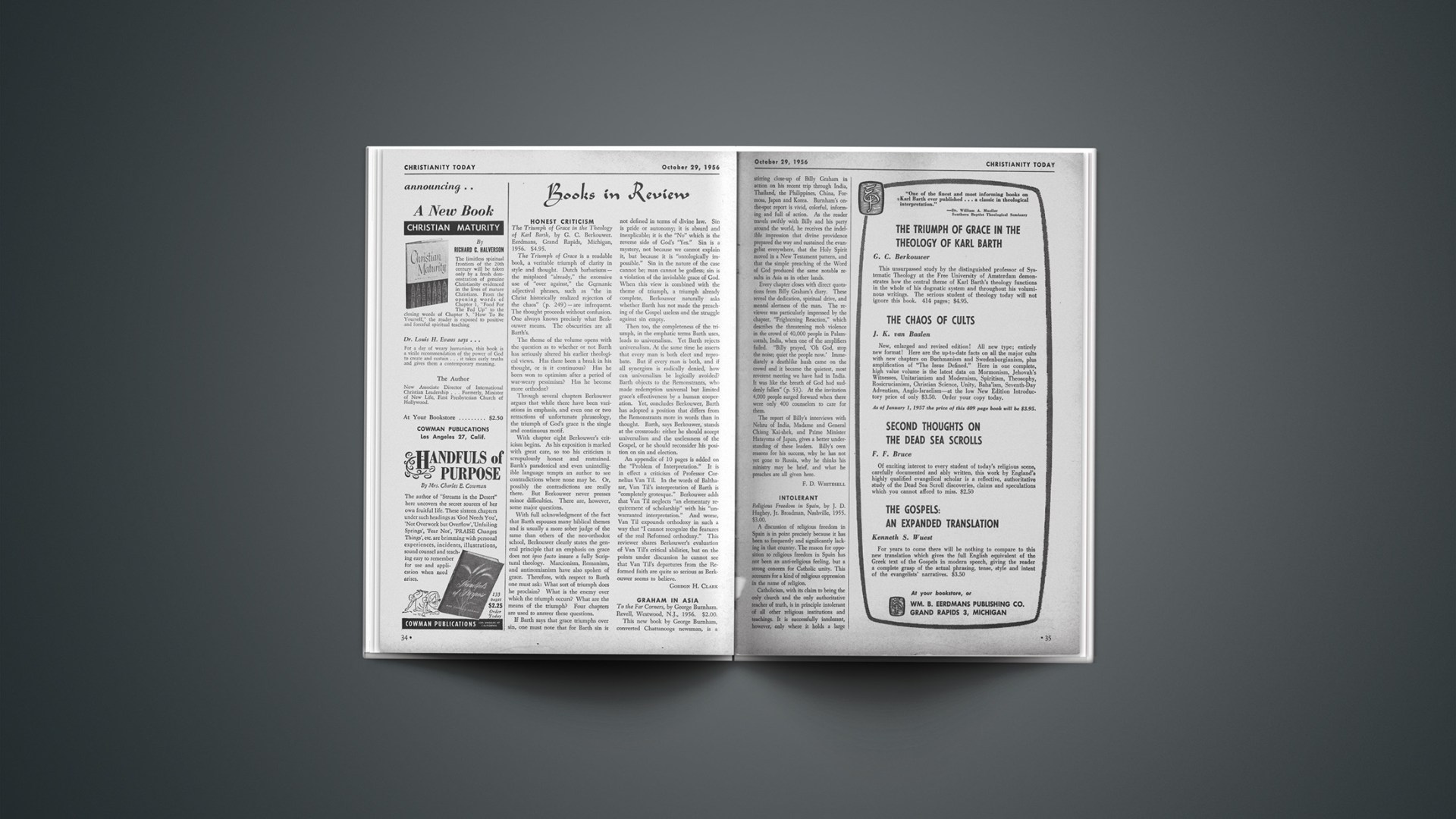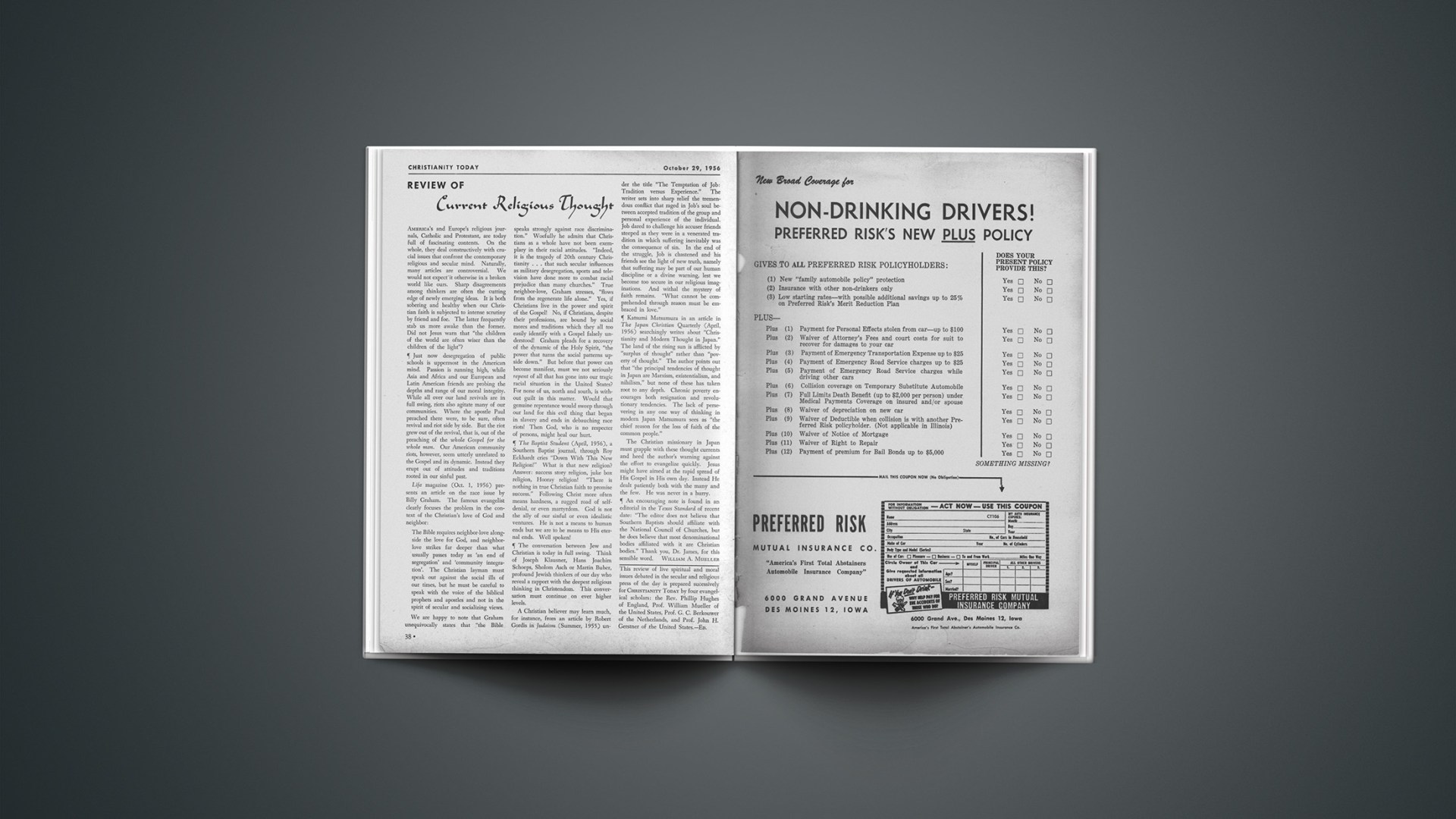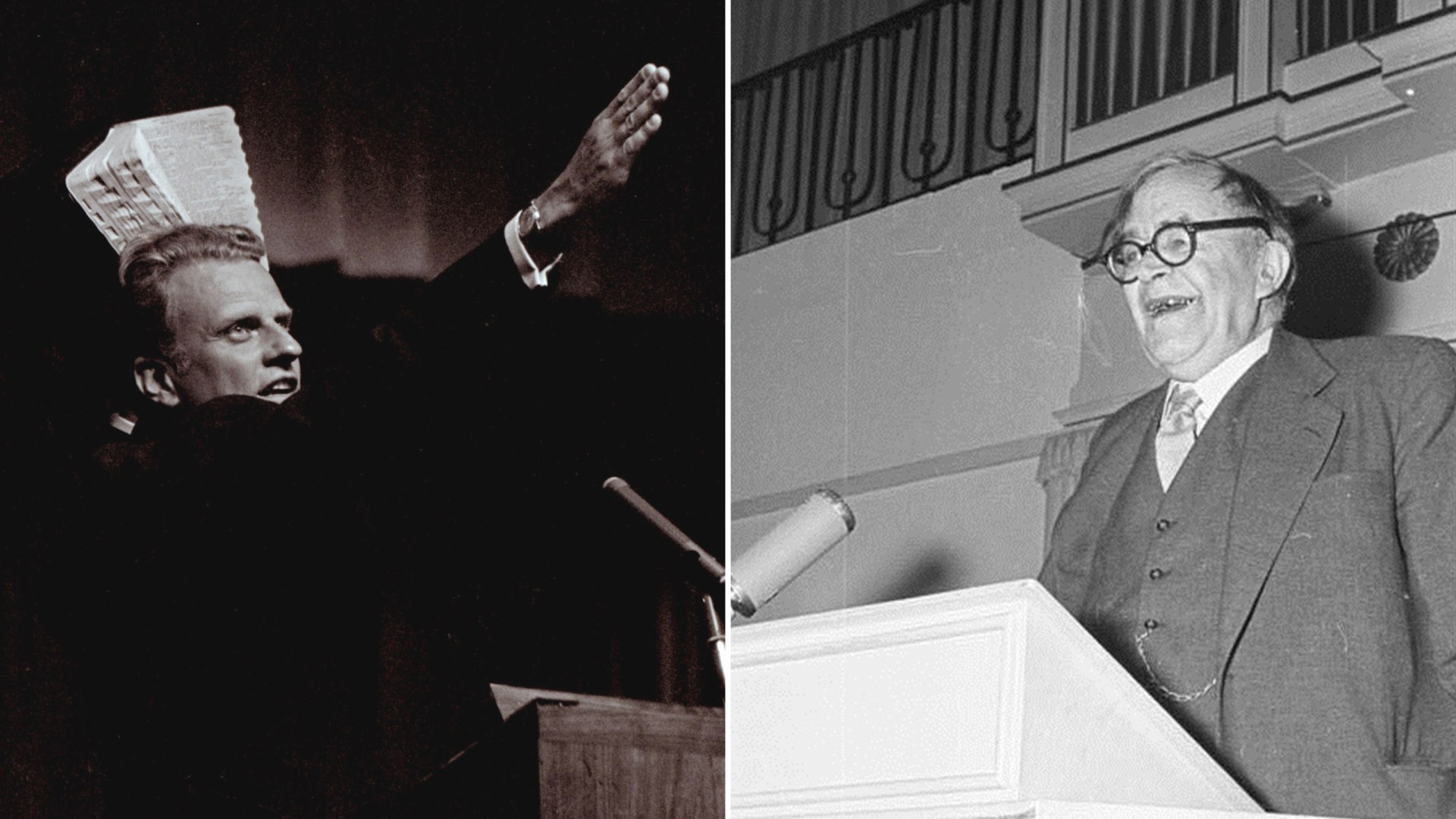And Simon Peter answered and said, Thou art the Christ, the Son of the living God (Matt. 16:16).
The majority of ministers face two problems in preparing sermons. The first is lack of time, because of the many demands made upon the average minister. The second is the scarcity of books for research. In this space each month CHRISTIANITY TODAY will provide the results of textual research to assist and to stimulate the busy minister in his preparation.
This is a simple but satisfactory Confession of Faith. We should always be ready to give an answer to those who would know what we believe on a matter so central as the person and nature of our Lord. A mistake on this point would involve all our religion in failure. If He is not to us the Christ, the Lord’s Anointed, and “the Son of the living God,” we know not Jesus aright.—C. H. SPURGEON.
We feel the force of it better in this and many passages of the Gospels, by using the Hebrew word Messiah. “Thou” is expressed in the Greek, and therefore emphatic.… The earliest disciples of Jesus, including Simon Peter, at once concluded that He was the Messiah (John 1:41, 49). But He proceeded to act so differently from what they had been reared to expect of the Messiah, that they would naturally become uncertain even as John felt in his prison. Again and again, however, some work or word would persuade them afresh.… We understand the importance of this confession when we hear a Jew of the present time announce his new-found conviction that Jesus of Nazareth is the Messiah.—JOHN J. BROADUS.
As was to be expected from his impetuous character, and personal superiority, as well as from the future standing already assigned him in John 1:42, Peter assumes the part of a spokesman, and in a decided and solemn manner declares Jesus to be the Messiah, the Son of the living God. Both elements combined, the work and the person constituted then, as they always do, the sum of the Christian confession. Compare Matthew 26:63; John 11:27, 20:31; Philippians 2:11; 1 John 2:22 ff.—H. A. W. MEYER.
The Meaning Of “Christ”
The name Christ in Greek, Messiah in Hebrew, bearing as it does, the participial or adjective sense of anointed, was capable of being applied, and actually was applied, in the earlier parts of Scripture, to a variety of persons. Because the high priest was emphatically the anointed one at the first institution of the tabernacle worship, he is therefore called “the priest, the Christ” (Heb. hamschiach, Lev. 4:3). After the institution of the kingly office, and the setting apart of him who bore it by an act of consecration with oil, he became, in a peculiar sense, the Lord’s anointed, or the Christ of the Lord, as Saul is once and again designated by David (1 Sam. 12:3, 5). Hannah, however, at the close of her song of praise, has already given the word a loftier direction—not without respect, it may be, to the more immediate bearers of the royal dignity, but still more especially pointing to one who should gather into his person the highest powers and prerogatives associated with the chosen people, and give them a world-wide development; for she speaks of the Lord “exalting the horn of his Messiah” (anointed), so as, at the same time, to “judge the ends of the earth.” In Psalm 2, the Lord’s Christ is He who is God’s Son by way of eminence, and who receives the heritage of earth to its utmost bounds as His sure possession. In Daniel 9:25, 26, we find the term applies to the expected deliverer, without the article or any accompanying epithet, precisely as a proper name.—IMPERIAL BIBLE DICTIONARY.
The importance of this first express acknowledgement of Jesus as the Christ or the Messiah, even by His own chosen followers, arises from the fact that all his public actions hitherto implied a claim to that exalted character, and that in consequence the truth of this claim was essential to the proof, not only of His public mission but of His personal veracity. The claim itself had reference to the clear prediction of a Great Deliverer in the ancient prophecies, expressly called Messiah, or Anointed, both by David (Ps. 2:2) and by Daniel (9:25), and by implication so described in all the Scriptures which exhibit Him as filling the great theocratical offices of Prophet, Priest, and King, in which the previous incumbents only held His place till He should come, and to which they were set apart by unction, the appointed symbol of those spiritual gifts which fitted men for these high functions, and which He was to possess without measure. All this Jesus claimed, and all this Peter acknowledged Him to be, not only as a private individual when the truth was first suggested to him by his brother Andrew, but now as it were ex officio, in the name of all the twelve, and in response to an authoritative question from the Lord Himself.—J. A. ALEXANDER.
“Thou art the Christ,” the very person promised from the foundation of the world. Thou art “the Seed of the woman, in whom all nations are to be blessed”; the Shiloh that was to come, before that the sceptre should finally depart from Judah; “the Son of David, that shall reign over his kingdom for ever and ever.” Thou art He “of whom Moses and the prophets have written” so much, and in whom all that they have written shall be accomplished.—CHARLES SIMEON.
Christ was anointed with the oil of gladness above His fellows; i.e., above those who possessed with Him a fellowship or similarity of office, as types of Himself. Aaron was anointed High Priest; Saul was anointed King; Elisha was anointed Prophet; Melchisedec, King and Priest; Moses, Priest and Prophet; David, King and Prophet; yet none was ever anointed to the union and comprehension of all these offices together, but the Christ of God.—HORAE SOLITARIAE.
The Son Of The Living God
Jesus Christ is the Son of the living God and that means He is a person of the same substance and nature with God. As man begets his like, so God begets His like, and He is His only begotten Son.—THOMAS GOODWIN.
The term “Son of God” was understood by the Jews as of so high an import, that when Jesus claimed that title, he was considered as affecting an equality with Jehovah, and actually “making himself God.” In this sense Peter acknowledged him to be, not a mere man, but infinitely above all created beings, “Emmanuel, God with us,” even “God over all, blessed for evermore.”—CHARLES SIMEON.
Peter calls Christ, who was the Son of man, the “Son of the living God”; not in that or on that account whereon he is the Son of man, but because he is peculiarly, in respect of another nature than that wherein he is the Son of man, the Son of the living God. And if Peter had intended no more in this assertion but only that he was one among the many sons of God, how doth he answer that question, “But whom say ye that I am?” being exceptive to what others said, who yet affirmed that he was a prophet, one come out from God, and favored of Him. It is evident that it is something much more noble and divine that is here affirmed by Him, in this solemn confession of him on whom the church is built.—JOHN OWEN.
In this confession, the conglomeration, or gathering together so many articles in the Greek set afore every word, is as so many stars that call us to behold this eminency of His sonship and generation. This emphasis on every word in that small sentence, “Thou art that Christ; that Son of that God, that living God”; the like indigitation is never used but for some special intent, according to the nature of the matter spoken of. It is observed by some that the article o huios, the Son, is given to none but to this Son; lo, here it is also put to every word besides, when His sonship is solemnly proclaimed.—THOMAS GOODWIN.
God is said to be the living God, in contradistinction from idol deities, and as the author of life and its blessings. See John 6:69; Acts 8:37; 9:20; 1 John 4:15; 5:5 … Peter’s confession was full, clear, and explicit, bringing out the two-fold nature of Christ as born of man, and yet the Son of God, as both human and divine—a view so much in advance of the Jewish conception of the Messiah that our Lord declares it to have been communicated to him by a revelation from heaven.—JOHN J. OWEN.
Practical Application
Beg of Christ that He would anoint Himself king in our hearts, and prophet and priest in our hearts, to do what He did, to know His will as a prophet, to rule in us as a king, and to stir up prayers in us as a priest.—RICHARD SIBBES.
Jesus our hope, is Jehovah’s Messiah. He became Jesus, assuming human flesh, for the sake of His people; and as Jesus, or the Saviour, was anointed or became Christ, to complete their salvation. What wonderful love is implied under this term to poor sinners! He was, and is and ever will be the anointed one for their sakes. With what joy and celerity did Andrew run to meet his brother Peter, and with what a beautiful abruptness did he tell him: We have found the Messiah! The message was too welcome to be locked up; and doubtless Andrew, like most other young converts, would have been glad to communicate what he knew, and impart what he felt, to all the world.—HORAE SOLITARIAE.
Hence learn we to renounce all kings, priests, and prophets, in comparison of Christ; He is a priest to redeem, and a prophet to teach and reveal the mysteries of God, and He is the king to execute all God’s decrees.—THOMAS GOODWIN.
With Peter let us confess that Jesus is our Prophet, Priest, and King. Let us acknowledge Him: “Thou art my Prophet, my infallible teacher; Thou art my Priest, who has made atonement for me; Thou art my King, to whom I will render obedience.” It is such a confession that constitutes a Christian.
When the Apostles went about proclaiming this confession, what happened? Christians were placed in prison; some were burned at the stake; some were thrown to lions; and some were crucified. The forces of Satan in all their hellish power sought to destroy the young Church. But the Church prevailed because she proclaimed that Jesus was the Messiah, the Prophet, Priest, and King of God. During the dark ages the Church began to revise Peter’s confession, in effect. Man was cast in the role of mediator between God and man; and man’s loyalty was to man. The Reformation rediscovered the confession of Peter and proclaimed it with triumph in spite of persecution. The Church today needs to rediscover the centrality of this great confession. Such a refocusing may well kindle the revival fire so long awaited.
Those who would make this confession sincerely must receive supernatural assistance. Jesus said to Peter, “Flesh and blood hath not revealed it unto thee, but my Father who is in heaven.” No man has eyes to see this truth, till the veil is removed from his heart, and his understanding is enlightened by the Spirit of God. The Apostle John declared in his first Epistle, “No man can say that Jesus is the Lord, but by the Holy Spirit.”












